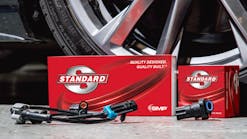Vendors, shops gearing up to serve alternative fuels trucking segment
Commercial fleet operators are increasingly confirming that lean and green work trucks running on alternative fuel systems are proving to be more-than-capable of taking on the meanest and most rugged of jobs while promoting environmental sustainability.
Other benefits are becoming apparent as well. For example, electrical utilities utilizing electric vehicles are realizing that EV bucket trucks not only last longer because of the simplified powertrain apparatus, but they are also improving crew safety via reduced noise levels – workers up top in the cherry picker can communicate more clearly with colleagues on the ground, and the work-hours can be efficiently extended for powerline maintenance tasks in towns with anti-noise ordinances.
Rigorous on-the-job testing lasting up to three years is standard operating procedure among fleets contemplating a company-wide shift to any type of alternative propulsion system. “They’ll try a truck or two,” says Doyle Sumrall, managing director of the National Truck Equipment Association (NTEA). “They’re not going to adopt a fuel or technology that doesn’t make economic sense.” Fuel supplies under review must show pricing stability and be readily available based on fill-up routing patterns.
“Range anxiety is a factor; there’s no question about that,” says Sumrall. “We’re seeing quite a few fueling stations come online” that are geared for alternative needs. “They’re certainly not on every corner,” he observes, but there are numerous stations throughout the country. “It takes some planning” by fleet managers to ensure practical fuel/charging sources based on route selection and other factors.
“If you look at Ohio it’s getting much better,” he says. There are 20 public compressed natural gas stations, with two CNG sites in Columbus and more on the way. The U.S. Department of Energy’s Alternative Fuels Data Center reports that the nation now hosts 15,128 public alternative fuel/charging stations.
A recent NTEA survey found that nearly 40 percent of the responding fleets are applying alternative propulsion systems in some manner.
Propane, known as autogas, tends to hold the global lead in this segment, while natural gas is more popular in the U.S., according to Sumrall, who will be taking part in a Green Truck Summit panel discussion during NTEA’s March 4-6 Work Truck Show at the Indiana Convention center in Indianapolis. Covering a half-million square feet and billed as North America’s largest work truck event, it features more than 500 industry vendors displaying vocational trucks, related equipment and accessories.
Educational sessions include a seminar for truck upfitters on implementing lean shop procedures that can boost productivity by 20 percent without adding staff or equipment.
Among the Work Truck Show exhibitors will be Powertrain Integration, which is converting 1,000 United Parcel Service delivery trucks to run on propane. “UPS bringing 1,000 of these units online is proof the medium duty sector has embraced the LC8 propane autogas engine as a gasoline and diesel replacement,” says PI President Robert Pachla. “This is the biggest propane autogas adoption to medium duty delivery vehicles I’ve seen during my 30 years in the alternative fuel business.” UPS has also been adding natural gas trucks to its fleet.
Based in Madison Heights, Mich., PI is actively seeking shops to join its authorized array of service providers that currently encompasses 10 states and remains on the move. “We need to complete that network in the U.S. and Canada,” says special programs coordinator Christopher P. Grasso. In addition to certified training, “we provide the special tools you need that a diesel shop would typically not carry.” Ongoing support for technicians is available from a team of professional engineers. “They address your calls and they speak English,” Grasso points out.
In November the Alpha Baking Co. rose to the top of the segment by wrapping up the 2014 Propane Autogas Fleet Award from the Propane Education & Research Council (PERC). “The bakery’s investment in propane autogas embodies how fleets across the U.S. can implement green practices in an economic and practical way,” says Tucker Perkins, PERC’s chief business development officer.
“Alpha Baking’s primary reason for adopting propane autogas was because it was the right thing to do. Propane autogas reduces harmful emissions, it’s made in the U.S., it reduces our dependency on foreign oil, it’s efficient, and it keeps our communities clean,” says Bob McGuire, the company’s vice president and director of logistics. “Choosing vehicles that run on American-made propane autogas has also allowed us to lower fuel costs without sacrificing performance.”
Canada’s Gaudreau Environnement and Gaz Métro Transport Solutions have recently launched CNG garbage trucks for permanent duty on the streets of Québec City. “Our road tests with compressed natural gas were very conclusive, both environmentally and economically,” says Johnny Izzi, Gaudreau’s general manager. “Natural gas generated substantial savings on the cost of fuel, and the quieter engines make our service even more respectful of the community we serve. It is also very important for us to do our share in reducing greenhouse gas emissions.”
“Natural gas as a fuel is enjoying growing popularity in Québec and North America with companies wishing to reduce their consumption of oil products, especially in the waste and recyclable materials collection sector,” says Gaz Métro’s Éric Desmarais. “Natural gas generates savings on fuel of up to 40 percent compared with diesel, in addition to reducing greenhouse gas (GHG) emissions up to 25 percent.”
Connecting with customers
Each of the alternative fuels gaining steady traction in the marketplace requires specific maintenance procedures to grease the wheels of widespread acceptability, according to Justina Reusch, owner of the full-service Reusch Diesel shop. Located in Ohio’s heartland on the edge of the Lake Erie Snowbelt, about half of the clientele consists of farmers along with agricultural truckers.
“We’ve got some guys running cooking oil or biodiesel,” reports Reusch, who started out repairing tractors with her father in Spencer, Ohio at the tender age of eight. Injectors tend to warrant heightened attention, and the shop installs fuel heaters for facilitating both fuel options. “The fuel needs to be continually heated at all times during the winter,” she says, recalling the cold brought about by the Polar Vortex. “Last winter the fuel systems were jelling up, and the fuel filters need to be changed more often.”
For shop owners and other aftermarket businesses wishing to connect with potential decision-maker customers, the National Association of Fleet Administrators (NAFA) serves executives who manage fleets of sedans, public safety vehicles, trucks, buses and a wide range of military and off-road equipment for organizations across the globe. Members are responsible for the specification, acquisition, maintenance and repair, fueling, risk management and remarketing of more than 3.5 million vehicles, including 1.1 million trucks.
An updated NAFA Sustainable Fleet Standard Program is scheduled to roll out during the first quarter 2015. “The importance of sustainable practices becomes more evident each day,” says NAFA President Claude T. Masters. “By becoming more energy independent and efficient, our members will extend benefits to their bottom line and their customer base.”
According to NAFA CEO Phillip E. Russo, “Fleet professionals will want to get in on the ground floor once they know what the program can do for them.”
“NAFA’s central role in the fleet industry will help this program create a tipping point for sustainable transportation,” notes John Boesel, president and CEO of CALSTART, a national non-profit association of more than 150 firms working to accelerate the growth of clean transportation technology. “We’re working with NAFA to make sure the standard is strong, but easy to use by any fleet – whether just starting out or far down the road on sustainable operations.”
The High-Efficiency Truck Users Forum (HTUF) is another CALSTART program focused on advancing the alternative fuels sector. It is operated in cooperation with U.S. Army Tank Automotive Research, Development and Engineering Center’s National Automotive Center.
Subscribe to Aftermarket Business World and receive articles like this every month….absolutely free. Click here.


